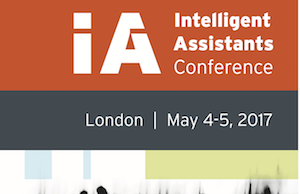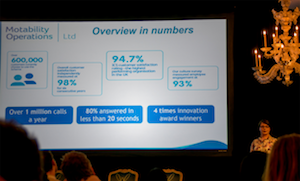 Last week at Claridge’s in London, Opus Research hosted its fifth conference dedicated to the role of intelligent assistant (IA) and authentication technologies to deliver a seamless, secure, personalized customer experience. The conference brought together companies actively using intelligent assistance technologies, solution providers, and organizations eager to reap the benefits of conversational user interfaces for digital self-service, intelligent devices, chatbots, and mobile apps.
Last week at Claridge’s in London, Opus Research hosted its fifth conference dedicated to the role of intelligent assistant (IA) and authentication technologies to deliver a seamless, secure, personalized customer experience. The conference brought together companies actively using intelligent assistance technologies, solution providers, and organizations eager to reap the benefits of conversational user interfaces for digital self-service, intelligent devices, chatbots, and mobile apps.
Participants were able to learn from real-life success stories of big-name brands such as T-Mobile, Amazon, Dixons Carphone, Skyscanner, HSBC, and BGL Group. They also heard industry experts offer insights on how to overcome the organizational and technical challenges of implementing intelligent assistance.
A key takeaway from the conference was that intelligent assistance is becoming more about augmentation than automation. Yes, successful IA solutions can “replace” human agents when it comes to answering routine questions. A human agent on webchat might only be able to handle three customers simultaneously who have questions about the company return policy; an natural-language powered IA could theoretically handle an infinite number of such queries in parallel.
But the big question is: Why would any company want its human agents to spend time answering routine questions about its return policy? By recording core knowledge about the business routine questions can be answered quickly and efficiently through self-service channels.
 Intelligent assistance starts by helping a company understand and document its core processes. Case in point is Motability Operations, which provides affordable vehicles and mobility solutions to people in the UK with special needs. Llaura Hughes of Motability presented on the organization’s use of Creative Virtual’s knowledge management (KM) tools. This underlying KM powers their AskMo intelligent assistant. At the same time, cataloging the organization’s processes and answers to the most frequent questions has had a huge upside for human agents. Now they can more quickly access the information they need to successfully handle inquiries.
Intelligent assistance starts by helping a company understand and document its core processes. Case in point is Motability Operations, which provides affordable vehicles and mobility solutions to people in the UK with special needs. Llaura Hughes of Motability presented on the organization’s use of Creative Virtual’s knowledge management (KM) tools. This underlying KM powers their AskMo intelligent assistant. At the same time, cataloging the organization’s processes and answers to the most frequent questions has had a huge upside for human agents. Now they can more quickly access the information they need to successfully handle inquiries.
For humans working in customer care, intelligent assistance becomes a valuable tool. The best IA solutions start with a knowledge base that gets updated over time. Natural language processing technology aids in understanding customer intent, no matter which interaction channel the customer chooses. Question answering technology automates the process of finding the best answer from the corporate knowledge corpus. In combination these tools provide a powerful ally to human agents, quickly suggesting answers while freeing them up to engage the customer in a way that only another human can.
During a panel discussion on striking the balance between humans and bots, a question was raised about whether new key performance indicators are needed to gauge the true value of intelligent assistance solutions. Perhaps first-call resolution is no longer the best metric? Mikhail Naumov of Digital Genius suggested a new metric labeled “Response Efficiency.”
The tools that enable IA empower customer support staff, helping them get to the best answer more quickly. It makes sense to start measuring this leap in human efficiency and quantify it in terms of return on investment. In short, IA does indeed entail elements of automation. But as widely illustrated throughout the London conference, intelligent assistants’ most important value seems to be in providing power to the people.
Categories: Conversational Intelligence, Intelligent Assistants, Intelligent Authentication, Articles

 Getting It Right: What AI Agents Actually Mean for Customer Support (Webinar)
Getting It Right: What AI Agents Actually Mean for Customer Support (Webinar)  Beyond the Basics: How AI Is Transforming B2B Sales at TP
Beyond the Basics: How AI Is Transforming B2B Sales at TP  Voice AI Agents Redefine CX: Trends, ROI, and Strategies for 2025
Voice AI Agents Redefine CX: Trends, ROI, and Strategies for 2025  Why Voice AI Is Foundational for Enterprise Innovation (Webinar)
Why Voice AI Is Foundational for Enterprise Innovation (Webinar)